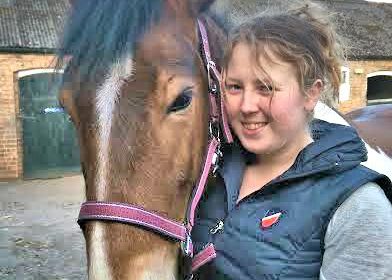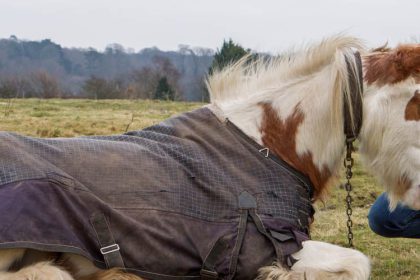Who will care for my horse if I die? (For the Livery Yard Manager the question is – Who will pay & care for the horse if my client dies?)
Plenty of our students have come across Livery Yards where an owner has disappeared or died and the poor Livery Yard manager has no choice but to handle the situation. Many try to raise money to keep the horse fed. Maybe some of the other owners will pitch in and help with food and day to day care. However, even if that happens, it is not really ideal and cannot go on for long. Horses we all know are expensive and time consuming.
If it is a ‘death of owner situation’ the probate can take a long long time yet the horse needs daily care immediately. If the family are not willing or not on hand to pay and care or the horse, what can be done to care for that horse and it’s upkeep.
If it is your horse and you were to die, you surely have an obligation to ensure it is cared for and the care is paid for – so you really do need to work out a way to pay the livery bills, feed, vet, farrir etc. etc. It is part of horse ownership just as much as insurance is part of ownership. If you have horse insurance you should also organise and set up arrangements for care of your horse should you die.
Handling older or sick horse when the time comes is covered in the online resource for the
Monty – Lisa Parks Photography Lingfield Level 1 Plus Equine Care & Management course
It is also available via the online resource folder for the 5 https://www.horse-care.uk/level-1-syllabus/
Many horses are part and parcel of our daily lives – in much the same way as our dog or
cat in our home. We need to consider what will happen to them should we die The answer could be a ‘Trust of Imperfect Obligation’
The following information is taken directly from a website set up by Arken Law – and is suggested by The Law Society
https://www.todayswillsandprobate.co.uk/provisions-pets-will/ The website states:
Provisions For Pets In A Will
There are a number of options for making provisions for pets in a Will.
The first decision to make is what happens to the animal/s – who they are to be given to and what is to happen to them. A Charity
If the testator (person making the will) cannot or does not wish to find a suitable home for their animal, they can elect for a charity to take the pet and find it a new home in the event that they pass away. The RSPCA, for example, offers a Home for Life service where the pet is bequeathed to the charity under a Will and the RSPCA undertakes the job of finding a new home for it. The Executors’ Choice
Testators can also choose to pass the decision over to their executors – by leaving the animal to their executors and trustees, they can also leave an Expression of Wishes guiding them as to the type of home that they might wish for their pet. This adds flexibility to the provision of care for an animal. While an Expression of Wishes allows the testator the ability to name beneficiaries of their pets and alternates, it also gives them the ability to change their wishes in the future without changing their Will. Family or a Close Friend
While the simplest option is to leave the animal as an outright gift to a person, there is always the risk that a chosen beneficiary may decline the gift. When faced with an enormous slobbery dog or an elderly and infirm cat, even the closest of friends may have second thoughts about taking on the responsibility of an animal. Financial Security
………. a testator may wish to leave financial provision for their animal in the event of their death. But as it’s impossible to leave money directly to the pet because they lack legal personhood, it is necessary to leave such sums for the benefit of the pet. The simplest solution is to leave a sum of money directly to the beneficiary who is receiving the animal with a wish that it be spent for the animal’s benefit.
This may not, however, give all testators sufficient peace of mind because, if the money is given as an outright gift in this way, there is nothing to stop the beneficiary from spending the money on themselves as they will be the owner of it.
A discretionary trust could be set up so that the beneficiary receiving the animal could be drip-fed funds by the executors of the estate – this gives more certainty to the testator that the whole of the fund set aside for Fido’s upkeep would be spent for the benefit of the pet and not on an exotic holiday. There would be more checks over the release of the funds by the executors who would have the discretion not to release the funds. The executors would also be able to withhold funds if the beneficiary declined to care for the pet.
An alternative option requires a little more forward planning but gives testators much more certainty that their pet will be appropriately provided for.
A trust can be set up at the same time the Will is made – for the benefit of the pet – with a nominal amount of capital settled on it and this trust can then be bequeathed a larger sum by Will.
The law of Equity generally requires that a trust has human beneficiaries, but the courts have conceded as ‘concessions to human weakness or sentiment’ that an anomalous type of trust can be created where there is a trust for some kind of public purpose.
This is called a “trust of imperfect obligation” because there is no human beneficiary who can enforce it, and can be split into three main categories: trusts relating to tombs and monuments; trusts for the provision of masses in private; and trusts benefiting a specific animal. Trusts of imperfect obligation
can be paid only for the purpose for which they are set up, and are permitted by the courts because they tend to “promote and encourage kindness towards [animals], to discourage cruelty… and thus to stimulate humane and generous sentiments in man towards the lower animals, and by these means promote feelings of humanity and morality generally, repress brutality, and thus elevate the human race”. But despite these lofty purposes, because these trusts represent a deviation from the beneficiary principle, the courts have stated that the maximum term of such a trust is limited to a duration of 21 years, which will normally be fine if the animal in question is a dog or a cat (although Crème Puff, a cat from Austin, Texas, holds the record of the world’s oldest cat at 38-years-old, so there are always exceptions). Future Flexibility
One other consideration to ask clients is: whether they are likely to replace pets or acquire additional pets. If a client expressly makes provision for Oscar the cat in their Will and Oscar dies but is replaced by Stanley the cat, the provisions in the Will for the care of Oscar may not necessarily apply to Stanley. It is therefore a good idea to expressly state that the provisions of the Will apply to all pets owned by the testator at the time of their death.
“Sadly, 54% of people don’t have a Will, leaving their treasured pets to the vagaries of intestacy laws,” continues Sam. “That’s a significant number of animals potentially ending up in locations where their owners hadn’t intended them to be.”



Receive latest news and industry insights straight to your inbox.